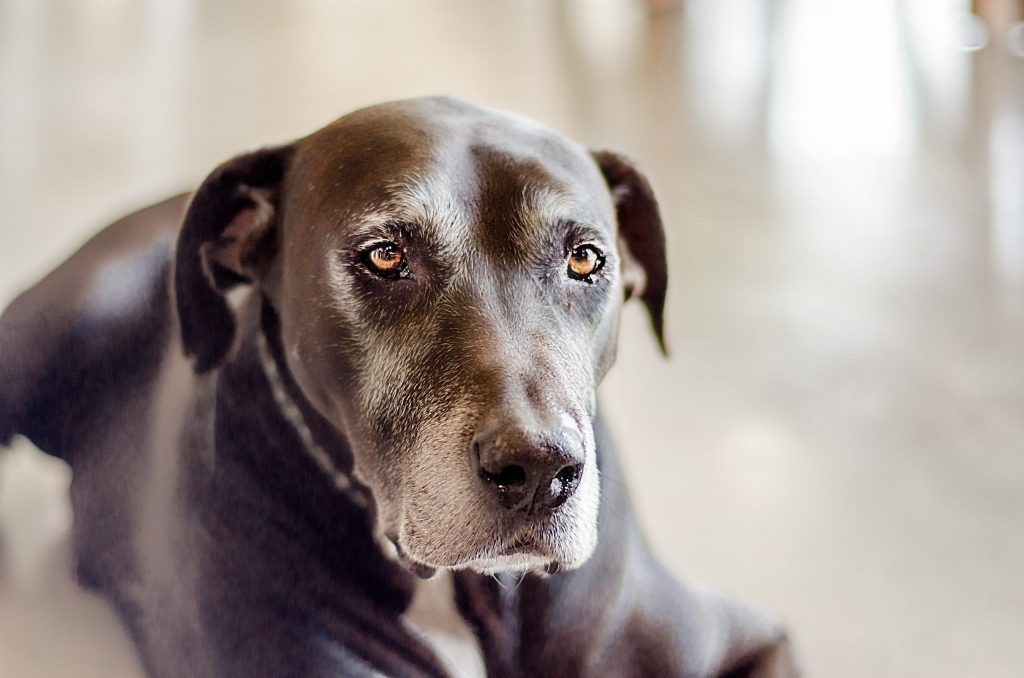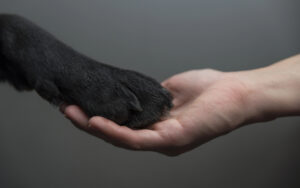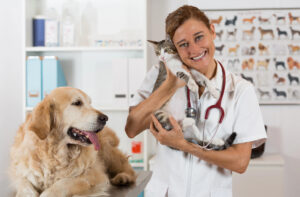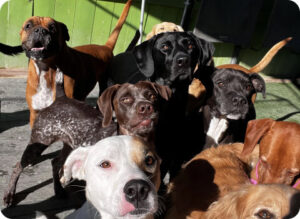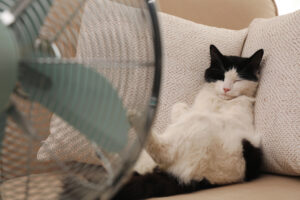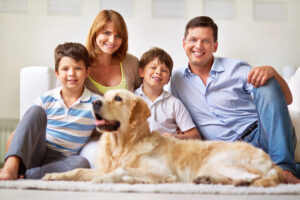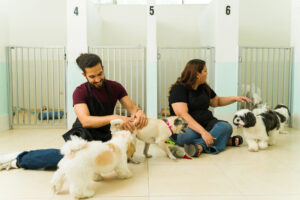As your dog reaches his senior years, he’ll be dealing with a lot of changes and it’s important that you adapt to these changes as well. Being kind and patient with your senior dog as he goes through and gets used to his physical and mental changes will be the most important thing to remember, along with making sure that you’re giving your dog the same care and commitment as always.
We hope that the following tips will help make your dog’s transition into his senior years as easy as possible and if you’re considering adopting a senior dog, you can get more tips here.
Tips for Senior Dog Care
Don’t Skip Vet Check-Ups!
Just like humans, it’s natural for your senior dog’s body to decline as he gets older. This can happen in the form of deteriorating vision, less mobility, or even cognitive impairment. It may also lead to issues with particular organs, such as their kidneys or heart issues. Because of this, making sure you take your dog to regular vet appointments will be more important than ever.
It’ll be helpful to work with your veterinarian to establish your dog’s baseline health profile while in mid-life and in good condition. By comparing the results of your dog’s annual check-ups to his baseline, you’ll be able to easily determine which changes call for further assessment or treatment.
If your dog has a long, shaggy coat, you may want to be even more vigilant, as his hair may hide serious issues such as tumors, cysts, or skin conditions. Hair can hide health issues for so long that you may not realize it’s there until it requires immediate medical attention.
Along with the baseline health profile, you can also work with your vet to create a body map for your dog. This will keep track of any existing bumps or lumps on your senior dog, so you know when you need to take action regarding anything new. This map can be very simple and created by drawing an outline of each side of your dog with marks indicating the location of current bumps.
The Right Diet is Key
Of course, as your senior dog becomes less active and his energy level drops due to age, his caloric requirements will also decrease. Because of this, you should focus on making sure that you’re feeding your dog the correct amount of dog food for his caloric needs. This, along with what you feed your dog, is important because being overweight can be very detrimental to a senior dog’s joints.
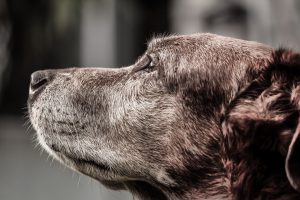 Making sure your dog is at a weight that is healthy for his body may even allow him to have fewer mobility issues as he gets older.
Making sure your dog is at a weight that is healthy for his body may even allow him to have fewer mobility issues as he gets older.
Regular exercise will also help your dog avoid gaining extra weight and stop your dog from becoming sedentary.
You may also be wondering if supplements are a good idea for senior dogs. While it’s important to consult with your vet before making changes to your dog’s diet, you should also keep in mind that most joint supplements for dogs don’t have strong scientific evidence to show that they work, or only have evidence in the form of studies financed by their manufacturer.
However, some unbiased clinical studies have shown that glucosamine and chondroitin are able to successfully boost joint function. Omega-3 fatty acids may also boost mobility, but research is still ongoing.
Hearing & Vision Loss
Hearing and vision loss are both natural in senior dogs, but it’s still a good idea to have your vet screen your dog when you notice these changes taking place.
In the case of hearing loss, your vet can screen for ear-canal inflammation or discharge. If either of these issues happen to be the reason for your dog’s hearing loss you can then treat these issues, or at least rule that they are the root of the problem.
You may also want to test your senior dog to ensure that his hearing loss isn’t just a case of “selective” hearing by shaking a package of his favorite treats or squeaking his favorite toy to see how he reacts.
 You may also notice your senior dog’s eyes becoming gray. While the cause of this can be cataracts in some cases, this is also a natural part of your dog’s aging process. If simply caused his age, the graying of his eyes will not affect his vision. Unfortunately, cataracts will, but the good news is that it’s possible to correct this through surgery.
You may also notice your senior dog’s eyes becoming gray. While the cause of this can be cataracts in some cases, this is also a natural part of your dog’s aging process. If simply caused his age, the graying of his eyes will not affect his vision. Unfortunately, cataracts will, but the good news is that it’s possible to correct this through surgery.
However, while surgical treatment is possible for cataracts, progressive retinal atrophy (PRA) can also cause vision loss in dogs, and unfortunately, there is currently no known treatment for this condition. If this is a concern, you can speak to a veterinary ophthalmologist who can screen for this.
Remember that as your dog begins to lose his hearing, vision, or both, he will become more easily startled and a natural reaction to this may be snapping. In order to avoid this, you’ll want to take extra precautions if you have loud puppies or small children in your home. You may also want to ask guests to take care to avoid startling your dog as well, to make sure he is as comfortable as possible.
Cognitive Changes
As your dog gets older, you may also notice his behavior changing. For example, he may begin to bark for no reason, stand in a corner, or even forget routine things. If this leads you to wonder whether your senior dog is developing a form Alzheimer’s, the answer may be yes.
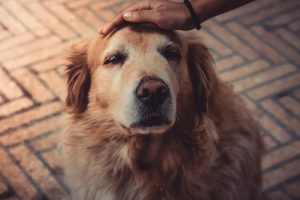 In dogs, this condition is known as canine cognitive dysfunction (CCD). The problem is that there is no definitive test that can be used to test for CCD, so your observations of your dog, along with medical checks, are very important in order to detect this condition.
In dogs, this condition is known as canine cognitive dysfunction (CCD). The problem is that there is no definitive test that can be used to test for CCD, so your observations of your dog, along with medical checks, are very important in order to detect this condition.
Like PRA, there is currently no way to cure or treat CCD, but research is ongoing. However, a diet rich in antioxidants, vitamins E and C, and fruits and vegetables may improve learning and memory in senior dogs. Exercise may help improve your dog’s cognitive function as well, so staying active will do a lot of good.
Routine Changes
You may have to change your senior dog’s daily routine as well. Although he may have spent all day going up and downstairs in the past, he may no longer be able to do this. If his bed, food, and water are kept upstairs, you may want to move this downstairs to accommodate his mobility limitations. You may also want to keep these items close to each other, to avoid causing him to walk too much.
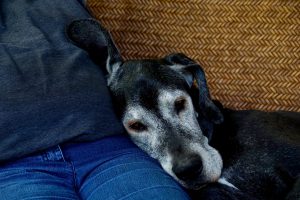 These mobility issues may also require ramps to help him get in and out of the car or on and off couches and beds. Other accommodations that may help your senior dog live more comfortably include extra soft bedding or more towels and blankets to sleep on or placing rugs on hard surface flooring, which may help your dog get his footing more easily.
These mobility issues may also require ramps to help him get in and out of the car or on and off couches and beds. Other accommodations that may help your senior dog live more comfortably include extra soft bedding or more towels and blankets to sleep on or placing rugs on hard surface flooring, which may help your dog get his footing more easily.
It may also be wise to cut down on outdoor time when the weather is either extremely hot or extremely cold, as senior dogs are more sensitive to temperature changes and have less ability to thermoregulate their bodies.
Although exercise is important, you may also need to cut down on how long your walks are or how much time you spend exercising your senior dog. He may no longer be able to handle the amount of exercise he previously could and it’s important to accommodate this. Pay close attention to signs that he’s ready for a break from exercise and let him rest as much as he needs to.
Lastly, if your dog is blind, hard of hearing, unable to walk, or has some other disability, speak with your vet about what you can do to accommodate these issues and make life easier for your dog.
Fon Jon Pet Care is Here to Help!
If you are in the San Diego area and looking for quality pet care services, including dog training, you can rely on Fon Jon Pet Care. Contact Fon Jon Pet Care at 1-858-250-3601 or visit our site today and we will be happy to help you with your pet care service needs.




